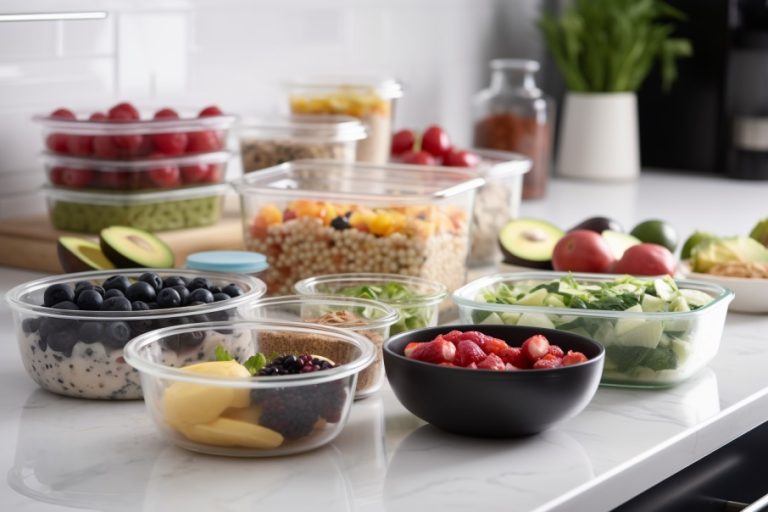We review and select products independently. Purchases through our links may earn us a small commission. Learn more.

Eating healthy meals is important for your overall health and well-being. It can be hard to know where to start when trying to make better food choices. Fortunately, there are some simple tips to help you make the most of your meals.
In this article, we’ll discuss seven tips for preparing healthy meals that will help you reach your health goals. You’ll be able to create meals that are both nutritious and delicious!
1. Stock Your Kitchen with Healthy Ingredients
Fill your pantry with the highest quality ingredients you can find to ensure your meals are delicious and nutritious! When grocery shopping, make a shopping list and stick to it. This’ll help you avoid impulse buys and overbuying foods.
Pay attention to portion sizes, as well as the nutrient balance of the ingredients you purchase. Look for smart swaps—for example, swapping out grain-fed meat for grass-fed meat—to get the most nutrients for your meals.
Incorporating clean eating into your grocery shopping can also help. Clean eating’s about choosing minimally processed foods that are closer to their natural state. Like various types of healthy juices for weight loss.
Incorporating these practices into your grocery shopping routine will help you create healthy and delicious meals!
2. Plan Your Meals
Planning your meals is key to saving time and money. Meal prepping is a great way to save time and money while making sure you’re getting the right portion of healthy ingredients.
Meal prepping involves making all your meals for the week in advance, so you don’t need to worry about grocery shopping and cooking every day.
By planning out your meals for the week, you can make sure you’re not overspending on groceries, and you can also make sure you’re getting the right balance of macronutrients to meet your dietary needs. Furthermore, meal planning allows you to portion out your meals in advance, so you don’t have to worry about overeating or not getting enough of the right foods.
With a little bit of effort and planning, you can save time and money while making sure you’re eating healthy meals.
3. Use Whole Foods
By incorporating whole foods into your meal-prepping routine, you can get the most out of your meals.
Shopping at your local farmers market or grocery store for organic produce can help you avoid unhealthy additives and preservatives. Plus, it’s a great way to get a variety of fresh ingredients.
With the right ingredients, you can create delicious and nutritious meals.
4. Choose Healthy Cooking Techniques
When it comes to cooking, there are plenty of healthy techniques you can use to create tasty dishes.
Grilling is a great way to cook your favorite meats and vegetables without all the added fat that comes with frying.
Instead of boiling your vegetables, try steaming them instead. This will help retain their nutritional value and flavor.
Baking is a great alternative to the traditional deep frying of foods. You can get the same great taste without all the added oil.
Sautéing is a great way to cook vegetables and proteins, and it can save you time compared to stir-frying.
Roasting is a great way to get all the flavor without having to use the broiler, which can be unhealthy due to the high heat.
All these techniques can help you create delicious, healthy meals.
5. Cook in Bulk
Cooking in bulk is a great way to save time and money. Not only will you only have to cook once or twice a week, but you’ll also be able to portion leftovers, add variety to your meals, utilize seasonal produce, reduce waste, and shop locally.
Once you have the ingredients, make sure to portion everything out accordingly. This will help to reduce food waste and make sure that you have enough food for the week.
6. Choose Healthy Fats
Choosing healthy fats can make all the difference in your meals, so don’t skimp on using butter, tallow, or ghee.
Ron Scott from Carnivorous Life mentions that he has seen amazing results from using real animal fats when it comes to weight loss and overall health.
When selecting fats for your meals, it’s important to opt for these healthier options to ensure you are getting the best nutrition for your body.
7. Use Fresh Herbs and Spices
Adding fresh herbs and spices to your dishes can take them to the next level, so don’t be afraid to get creative! Fresh herbs and spices provide a depth of flavor that can’t be achieved using dried, store-bought options.
When used in combination, the flavor of a dish can be enhanced in unexpected ways. For example, pairing oregano and thyme can add a pleasant, earthy flavor to a dish. Experimenting with flavor combinations is a great way to add variety to your meals.
When using fresh herbs, it’s important to store them properly. Herbs should be kept in the refrigerator, wrapped in a damp paper towel, and placed in a loosely sealed plastic bag.
For spices, store them in a cool and dry place away from direct sunlight. When shopping for spice blends, read the ingredients to ensure that they’re low in sodium and free of added sugars.
Conclusion
Overall, preparing healthy meals doesn’t have to be complicated. With a few simple tips and a few hours a week, you can easily create delicious and nutritious meals for yourself and your family.













